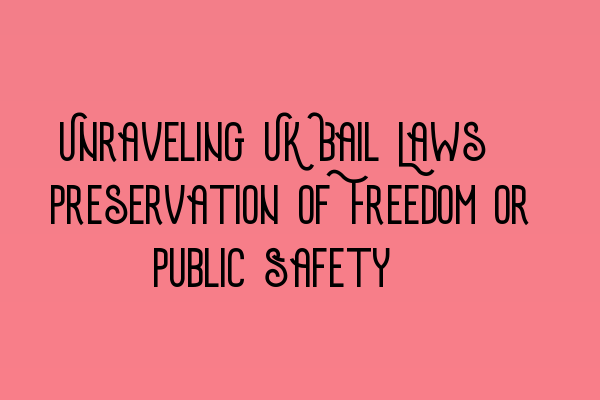Unraveling UK Bail Laws: Preservation of Freedom or Public Safety?
When it comes to criminal law in the United Kingdom, the issue of bail is an intricate topic that requires thorough understanding. Bail, commonly known as temporary release or conditional liberty, allows individuals accused of a crime to await trial outside of custody. The primary goal of bail is to strike a delicate balance between preserving individual freedom and ensuring public safety.
However, the complexities of UK bail laws can often leave both defendants and the general public with numerous questions. How does the court determine whether to grant bail or not? What factors come into play during the decision-making process? What are the potential risks and benefits associated with granting bail?
Let’s delve deeper into the intricacies of UK bail laws to shed light on these questions and provide a comprehensive understanding of the subject.
The Purpose of Bail
Bail serves several critical purposes within the criminal justice system. Firstly, it upholds the principle of ‘innocent until proven guilty,’ allowing individuals to maintain their freedom and normalcy of life while awaiting trial. This principle is foundational to a fair and just legal system.
Secondly, bail is designed to prevent the unnecessary detention of individuals who do not pose a risk to public safety or are unlikely to abscond. This helps to reduce the burden on prisons and allows defendants to participate in their legal proceedings actively.
However, the preservation of individual freedom through bail must be carefully balanced against the need to protect the public. The court’s paramount concern is the safety and security of the community, and it will consider various factors to determine whether bail should be granted or not.
The Factors Considered in Granting Bail
The decision to grant or deny bail is not made arbitrarily. The court carefully weighs relevant factors to ensure public safety while respecting the rights of the accused. These factors may include:
- The seriousness of the offense: The more severe the alleged crime, the higher the likelihood of remand in custody.
- The defendant’s criminal record: Previous convictions or pending charges can impact the court’s decision to grant bail.
- Risk of re-offending: The court assesses the likelihood of the defendant committing further offenses while on bail.
- Risk of absconding: The court considers the likelihood of the defendant fleeing from justice or failing to attend future court hearings.
- Intimidation or interference: The court evaluates the potential for the defendant to intimidate witnesses or interfere with the ongoing investigation.
- Protecting the victim: The court takes into account the safety of the victim and ensures their security during the legal process.
These factors are crucial in helping the court determine whether granting bail would be in the best interest of public safety and the fair administration of justice.
Potential Risks and Benefits
Granting bail entails a degree of risk, considering that individuals accused of crimes may have the opportunity to commit further offenses or evade justice. However, there are also several benefits associated with bail:
- Preserving individual liberties: Bail allows defendants to maintain their freedom and continue with their daily lives outside of custody.
- Facilitating defense preparation: Defendants on bail can collaborate more effectively with their legal representation to gather evidence and prepare a robust defense.
- Reducing prison overcrowding: By enabling bail for non-violent and low-risk individuals, the burden on the prison system can be alleviated.
- Promoting community engagement: Bail allows defendants to remain active and engaged in their communities, reducing the potential negative consequences of pre-trial confinement.
It is crucial to strike a balance between these benefits and the risks associated with granting bail by carefully evaluating the individual circumstances of each case.
In Conclusion
Unraveling UK bail laws reveals a complex landscape where the preservation of individual freedom coexists with the need to ensure public safety. The courts carefully assess various factors to make informed decisions regarding granting or denying bail. While bail presents risks, it also provides numerous benefits such as preserving individual liberties and promoting community engagement.
It is essential for defendants, legal professionals, and the general public to have a comprehensive understanding of UK bail laws to navigate the criminal justice system effectively. To explore related topics, you may find the following articles helpful:
- Legal Representation for Delaware LLCs in the UK: Expert Advice
- SQE Exam Prep: Essential Study Materials for Aspiring Solicitors
- Expert Testimonies in UK Courts: Building Strong Cases
- Demystifying the Solicitors Qualifying Examination Format
- SQE Exam for International Lawyers: Challenges and Success Strategies
By staying informed and aware of the intricacies of UK bail laws, individuals can better navigate the legal system and ensure the preservation of both individual freedoms and public safety.
